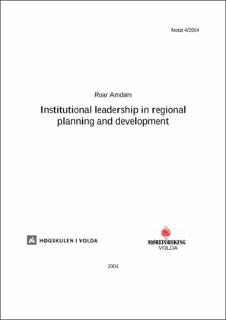| dc.description.abstract | In this paper I discuss the need for institutional leadership in regional planning and development processes. I define institutional leadership in accordance with Selznick (1984) as to bring the fundamental values for the existence of the region as an institution in to the regional planning and development process. I regard this process as political will forming activities that can contribute to the legitimating of municipalities, counties and other regions as political actors (Habermas 1995). We know that this is a very complex process that includes operative, tactical, strategic and institutional planning in a blend of top down and bottom up policy. The planners will as process leaders have different roles to play in this process, but in this paper I shall concentrate on the institutional leadership role. The hypothesis is that regions with lack of institutional leadership tend to take their existence for granted, to have an unclear mission, to have unsolved value conflicts, and to tend to have an unstable practice. | en_US |
